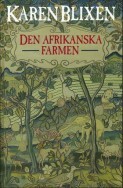Take a photo of a barcode or cover
adventurous
emotional
inspiring
slow-paced
This book was really bad
It had its moments, but it has no plot at all. It was just a lot of Blixens memories.
I liked the way she described Africa, but overall this was u huge waste of time. I was just counting the page until I was done...
Correction; it wasn't a total waste of time. Now I know I should never again read anything from karen Blixen
It had its moments, but it has no plot at all. It was just a lot of Blixens memories.
I liked the way she described Africa, but overall this was u huge waste of time. I was just counting the page until I was done...
Correction; it wasn't a total waste of time. Now I know I should never again read anything from karen Blixen
A escrita de Karen Blixen é sem sombra de dúvida, marcante e lindíssima. É notória a paixão que a autora nutria pela beleza selvagem de África e pelas pessoas diferentes que conheceu durante os anos em que viveu em Nairobi.
No entanto o livro é tão focado em relatos da sua vida na fazenda - qual peça jornalística - que se torna difícil formar algum laço emocional com a autora a menos que o assunto seja do particular interesse do leitor. É importante enquadrar a obra no tempo e espaço mas há uma certa condescendência na sua escrita sobre nativos africanos capaz de provocar um revirar de olhos a cada parágrafo.
No entanto o livro é tão focado em relatos da sua vida na fazenda - qual peça jornalística - que se torna difícil formar algum laço emocional com a autora a menos que o assunto seja do particular interesse do leitor. É importante enquadrar a obra no tempo e espaço mas há uma certa condescendência na sua escrita sobre nativos africanos capaz de provocar um revirar de olhos a cada parágrafo.
I like books about other times and other places foreign to my own experience, so although this gets a mite tedious in places, it was worth the read.
adventurous
reflective
slow-paced
A meditative travel memoir. The only similarities between the memoir and the film are the romanticization of colonial Africa, a few of the same characters (human and non-human), and a coffee plantation. A pretty slow-paced read, not because it is particularly challenging but because it reads like a series of short stories reflecting on country life.
Dinesen is both a pragmatic and lyrical writer. She seems to really love Africa and the people - her observations are of wonderment and reverence. I enjoyed it, but now that I've set the book aside, I feel unsettled.
This book encapsulates the receding tide of African culture. Dinesen writes, "It was not I who was going away, I did not have it in my power to leave Africa, but it was the country that was slowly and gravely withdrawing from me, like the sea in ebb-tide. The procession that was passing here,--it was in reality my strong pulpy young dancers of yesterday and the day before yesterday, who were withering before my eyes, who were passing away for ever. They were going in their own style, gently in a dance, the people were with me, and I with the people, well content."
This book encapsulates the receding tide of African culture. Dinesen writes, "It was not I who was going away, I did not have it in my power to leave Africa, but it was the country that was slowly and gravely withdrawing from me, like the sea in ebb-tide. The procession that was passing here,--it was in reality my strong pulpy young dancers of yesterday and the day before yesterday, who were withering before my eyes, who were passing away for ever. They were going in their own style, gently in a dance, the people were with me, and I with the people, well content."
The atmosphere and descriptions are what made this book beautiful. I enjoyed hearing the authors stories and experiences with Africa and the people.
I’d be more generous with the stars - she certainly has a way with words - if it weren’t for the approximately two dozen less-than-flattering comparisons between native Africans and animals in the first forty pages alone.
This book has been on my radar for a very long time but I’ve never really gone out of my way in researching the author’s background. The book also did not provide any background as to who the author is (I know her name which is on the cover of the book and that she’s in Kenya and that’s it) or why she’s in Kenya or how it was all arranged to be so. I was about 2/3 of the way through the book before I thought that’s what really bugging me about the book and went online to search for a bit more info. In a way, that actually helped me enjoy the book a little more than I would have. I didn’t particularly enjoy the book; it is rather like extracts of diary entries of personal reflection of author’s life on an African farm so I felt disjointed reading it because whilst there a chronological feel to the main part, there were plenty of past reflections. I did like some of the anecdotes but what’s really clear is the author’s love for her farm, her adopted country.






